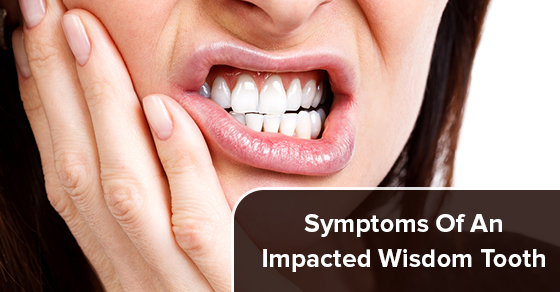
Wisdom teeth have nothing to do with being wise.This is proven over and over again, when patients fail to recognize that they have an impacted wisdom tooth. As a leader in family dentistry, we see many cases where family members come to us for help because they failed to recognize the 6 symptoms of an impacted wisdom tooth.
Wisdom teeth are the last molar on each side of the upper and lower jaw. They usually break-through naturally when patients are between the ages of 17-25.
If a wisdom tooth doesn’t break through the gums naturally, it is ‘fully impacted’ and is blocked under the gums. If the tooth only partially breaks through, it is ‘partially impacted’. This can occur because there isn’t enough room in the mouth for the wisdom tooth to grow. Sometimes it can come out crooked, sideways or tilted.
This misalignment can lead to many issues. Infections can spread to the throat and neck. Impacted wisdom teeth can decay, cause gum disease, and force other teeth near them to move.
It is important to recognize the symptoms before these issues can take hold.
It is wise to seek the care of a professional if any of these symptoms are apparent. Oakville Place Dental Office specializes in family dentistry and can evaluate if a wisdom tooth is impacted and if treatment is required.
Symptoms include:
If your wisdom tooth becomes infected, you may notice drainage, a bad taste in your mouth, a sore throat, and painful, swollen lymph nodes.
The best defense is usually being pro-active. Don’t wait for an impacted or partially impacted wisdom tooth to become problematic. It would be wise to bring your teenager in for an evaluation of their wisdom teeth before age 19 or 20. We can perform x-rays to diagnose if the tooth is coming in naturally and is aligned properly.
If extraction is recommended, it is easier to remove a wisdom tooth in the late teens than later in life, since the roots are not yet fully developed.
Be aware of the symptoms of an impacted wisdom tooth.
Contact Oakville Place Dental Office, a leader in family dentistry, for all members of your family.
 0 Comment
0 Comment